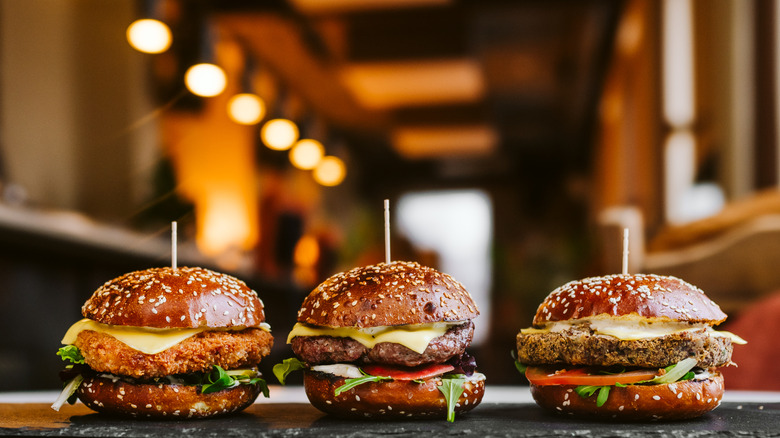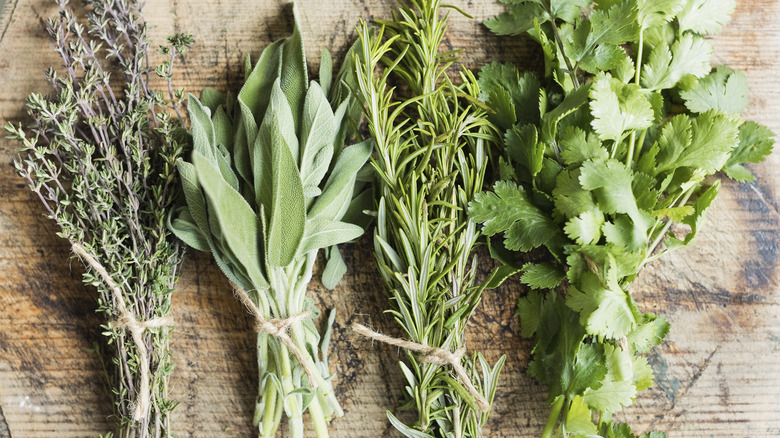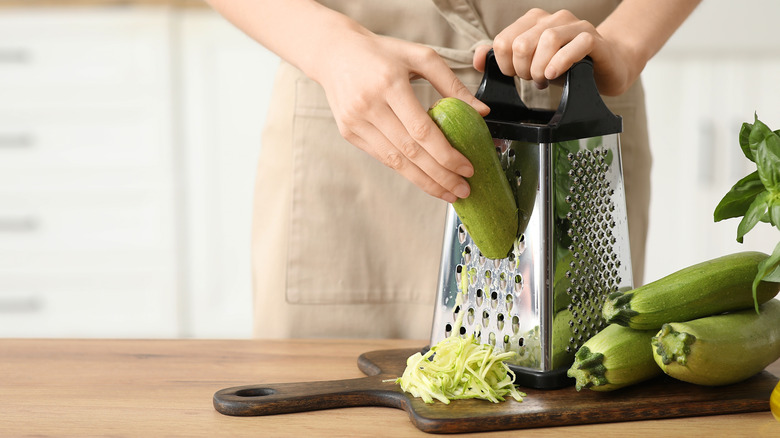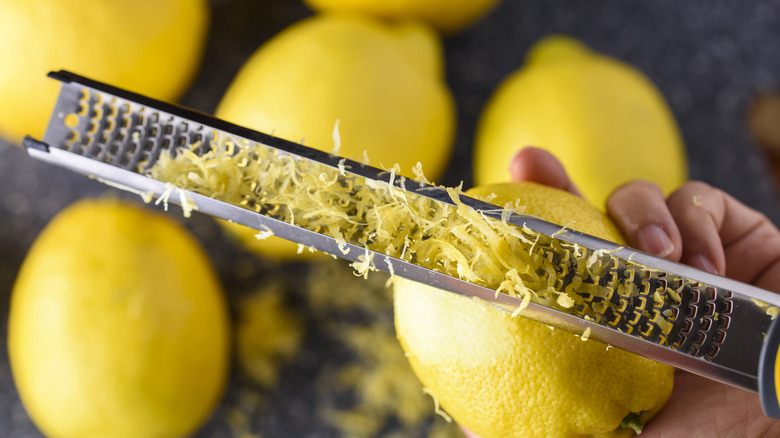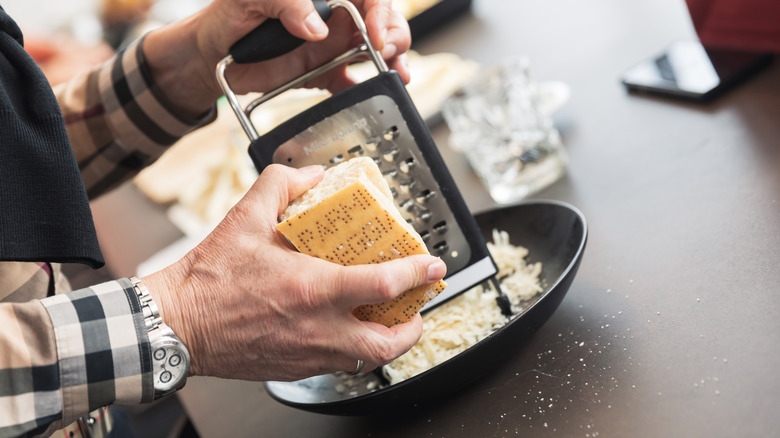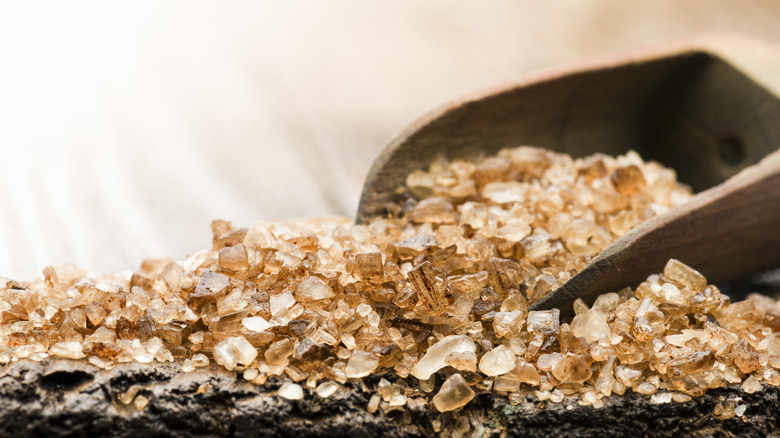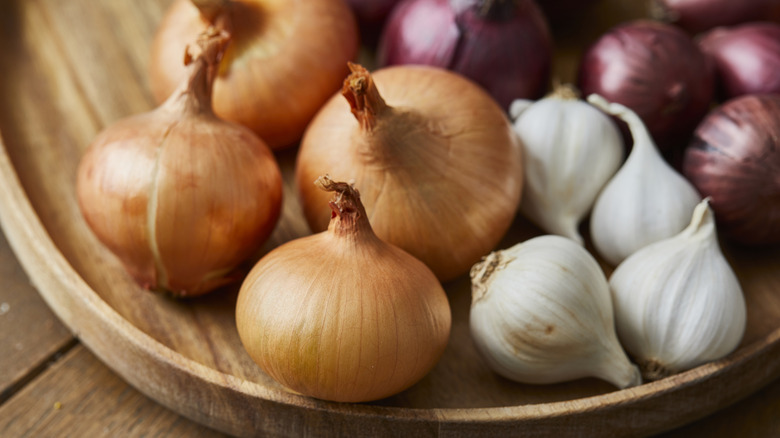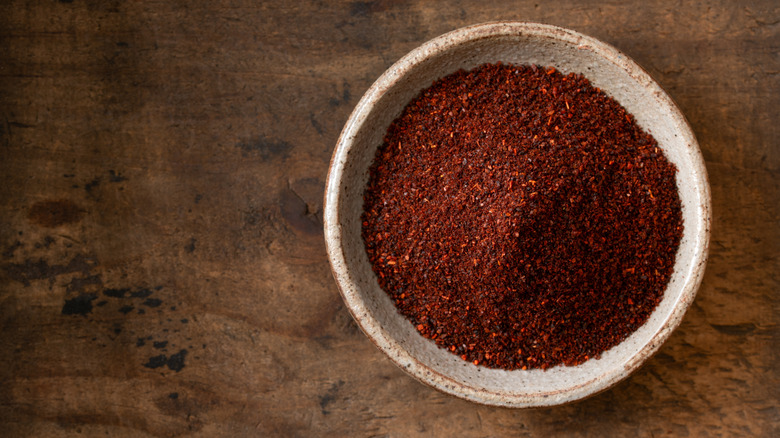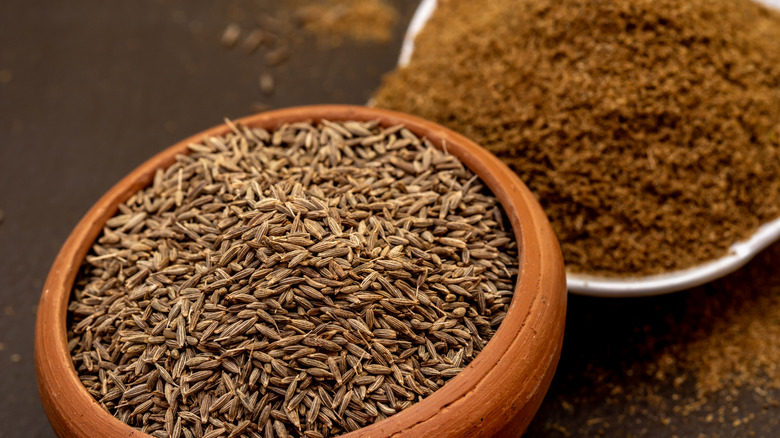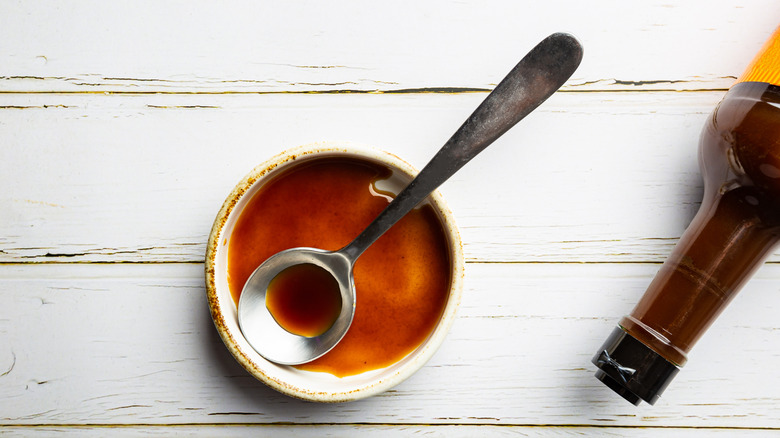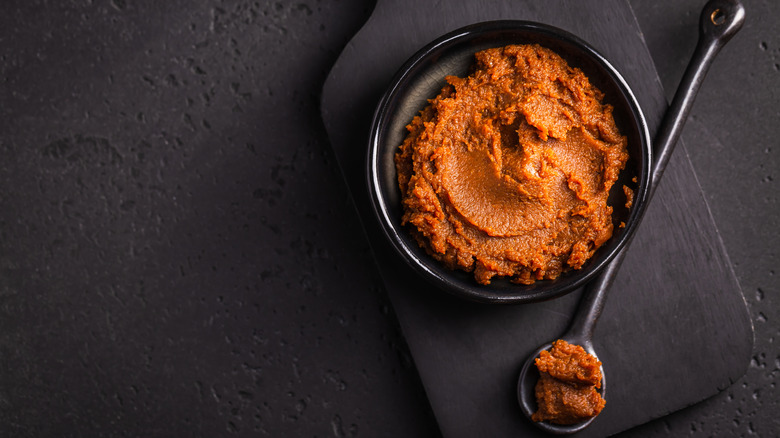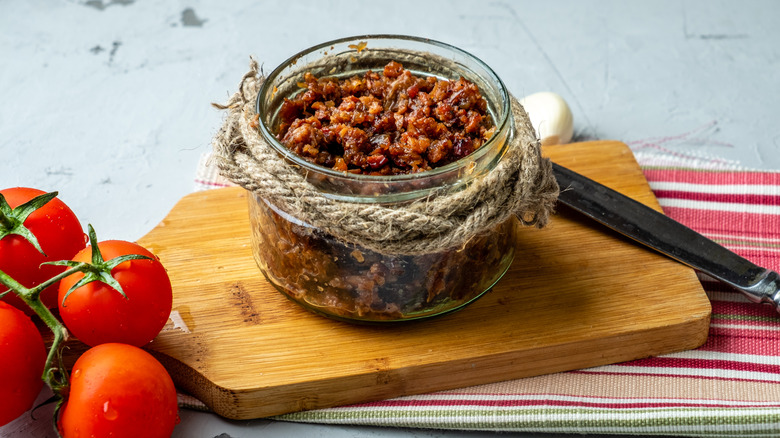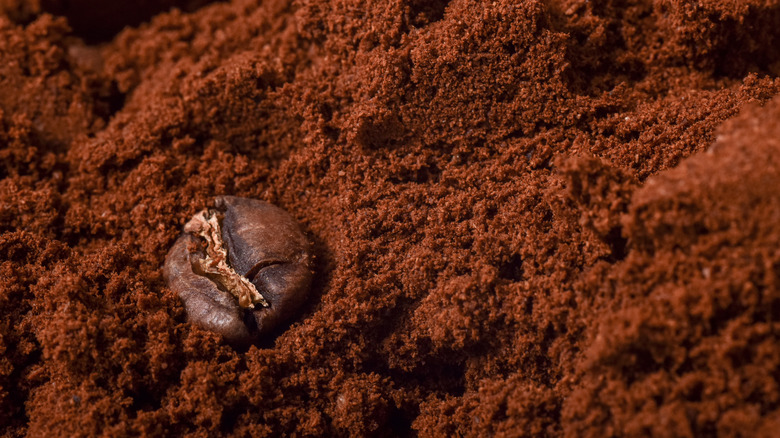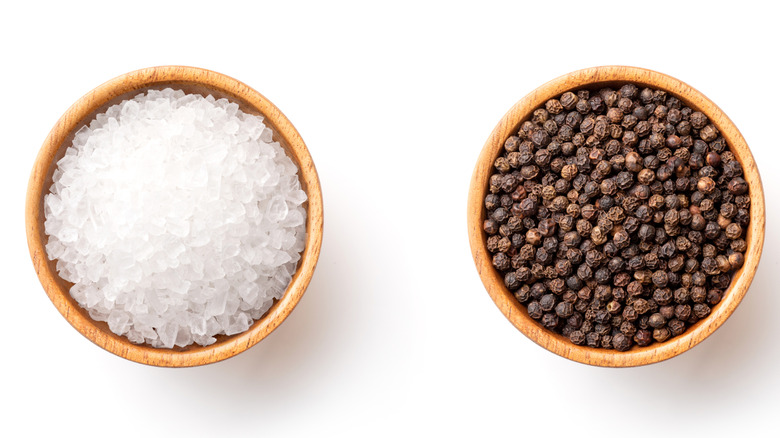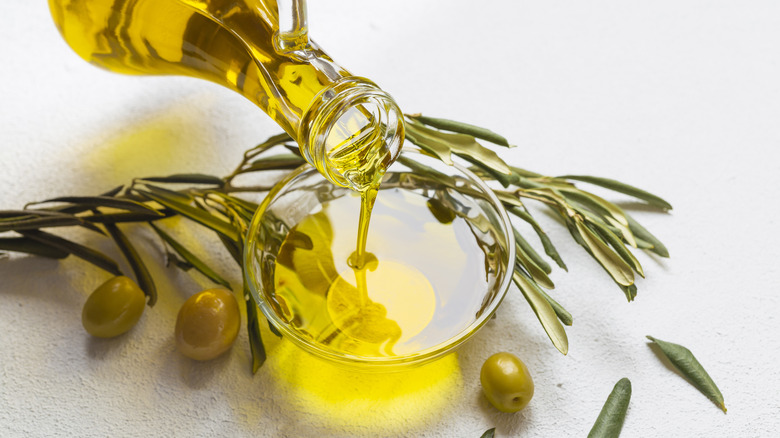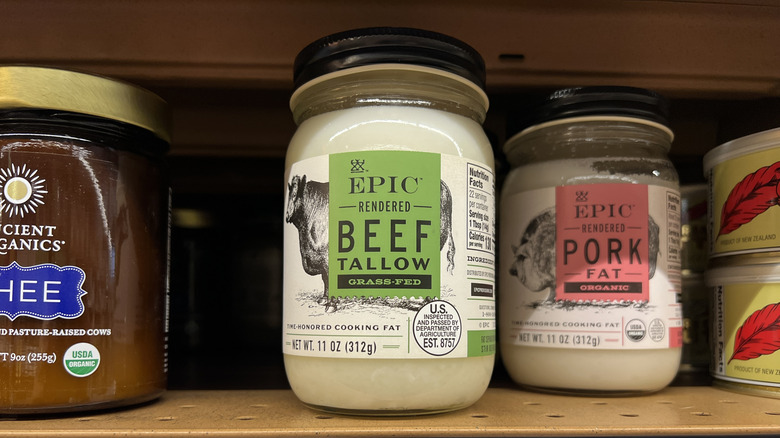15 Best Seasonings For Burgers
There are many ways to prepare a burger, but some methods certainly yield better results than others. We can debate how many toppings are too many toppings, and whether or not we need to follow Anthony Bourdain's one hand rule. But what about seasoning? There's some overlap in the world of toppings and seasonings, but the best burgers start before the meat even hits the grill. If your personal recipe could use an upgrade, here are some pro tips on how to season burgers for the tastiest results.
To season or not to season, that is the question. There are those purists who say good beef needs no addition to taste wonderful, and that may be the case. But if you're working with some average ground chuck and you feel like putting a twist on it, what should you grab from the spice rack to season your burger? What about when you're making a leaner turkey burger? Salmon burger? Veggie burger? How can we give those a much needed boost of moisture and flavor? We checked in with several experts, from butchers and chefs to sea salt purveyors, and rounded up their top tips for seasoning every kind of burger. Read on to find out what the experts have to say on this vital matter before getting your next burger between the bun.
Fresh herbs
There's loads to reach for in the spice rack, but what about those fresh leafy herbs? Turkey, chicken, and fish burgers especially benefit from the addition of some chopped fresh herbs. Parsley, dill, basil, cilantro, and even mint can add mountains of flavor to an otherwise blander minced meat. Turkey in particular is kind of a blank canvas that can be kicked up, and unlike beef it won't tend to have a ton of flavorsome fat to begin with. So our experts find lots of ways to add some much needed juiciness, color, and flavor.
"Turkey's lean and white," explains Chef David Figueroa, certified grillmaster and President, CCO, and Co-Founder of Melinda's Foods, "so it needs a little extra love and color." He adds a spice mix of kosher salt, black pepper, and cumin, to some fresh chopped parsley and works that into his turkey burgers. Or in a pinch, he'll reach for Melinda's Green Sauce and stir in a spoonful of the vibrant sauce which includes cilantro, jalapeño, spinach and lime to add "a pop of moisture and heat."
When it comes to salmon burgers for our pescatarian friends, Chef Fig says his go-to seasoning is a combination of sea salt, white pepper, dill, parsley or chopped tarragon, lemon zest, and a pinch of cayenne. That's triple herb action. Fish loves a dill pairing, and tarragon will up the sophistication of your flavor, but it has a particularly strong flavor, so be sure to taste and make sure you like it before adding in a whole bunch.
Grated Vegetables
When working with leaner meats, Ashley Lonsdale, ButcherBox chef-in-residence, recommends adding grated fresh vegetables into the mix. "Grated vegetables will release moisture when cooked," Lonsdale explains, "adding juiciness to burgers." This trick helps when the meat, or fish, is less fatty, and therefore prone to dry out. "Finely shredded zucchini and carrots are my favorites for adding moisture and sweetness, respectively," Lonsdale says. "Finely minced, salted mushrooms are wonderful at adding both savory notes and juiciness."
Mushrooms are famously an ingredient in many veggie burgers too (or sometimes they're the whole burger, as with a portobello burger). They have a meaty texture and a lot of flavor to offer. Chef David Figueroa uses fresh chopped mushrooms, garlic, and scallions in his veggie burgers to add lots of good bite and flavor.
Veggie burgers, turkey burgers, chicken burgers, and salmon burgers all benefit from grated fresh veg. Plus, it's a great way to sneak some extra veggies and nutrients into your dinner. Picky eater at the table? They'll never know the green stuff hit 'em.
Lemon
Keeping things fresh, we're moving from vegetables to fruit here. Chef Thomas Odermatt of Butcher's Bone Broth and Roli Roti calls lemon zest "a secret weapon that brightens and intensifies flavor." He will work some freshly zested lemon rind into the patties of chicken, lamb, and fish burgers, but not beef, he says.
Zest includes the pungent essential oils of citrus fruit, but if that weren't enough, Odermatt also likes to top things off with some roasted lemon juice. Pop a halved lemon on the grill while the burgers cook. Then, when they're coming off the heat, squeeze the roasted lemon over the burgers "for a subtle smoky-citrus punch." Talk about elevating the barbecue. Sounds pretty good to us.
Parmesan cheese
Just before you put the boxed grater away, we thought we'd give a little shout out to parmesan cheese. This super salty aged cheese is an excellent addition to burgers. When added to beef, you might start veering into Italian meatball territory, and who's to say that's not a good thing.
But when added to ground turkey, once again, this cheese will add some much needed flavor and a little moisture. It can go into the mix along with those herbs and veggies. Balance your salt accordingly.
Season salt
This is a bit of a catch all category that could include a range of flavors, but when you don't want to get into chopping fresh veg and searching through the cupboard for ten different spices, grab a good seasoning salt and you're set. It's easy to keep a few in stock, you can find them at most grocery stores. You can also make your own personal blend ahead of time using some of the other spices mentioned in this list. Or order something a little more luxe. We spoke to Amy Bayer, founder of Salty Provisions, a gourmet sea salt company producing award-winning seasoning blends made with Norwegian flaky sea salt, and she's passionate about creating the best burgers with the best season salts.
Blends like her zesty pickle, or double onion + roasted garlic, incorporate flavors already closely associated with favorite burger toppings right into the seasoning. Depending on your own tastes, you can opt for a smoky salt, a spicy salt, or Bayer even recommends a coffee salt blend.
Chef Thomas Odermatt of Butcher's Bone Broth agrees that a good smoked salt should be a go-to burger seasoning. Smoked applewood or hickory salt in particular, he says, can seriously elevate a fish burger. And that added smokiness is especially nice when you find yourself cooking burgers on a pan or a gas grill instead of a charcoal barbecue.
Garlic and onion granules
That leads us naturally to garlic and onion powder. Or garlic and onion granules. Garlic granules and powder aren't quite the same, though they fulfill the same basic flavor functions. Granules will tend to be a little larger, while powder is finely ground and therefore packs a bigger punch when used in equal measure. Both are made from dehydrated garlic or onion. You will often find garlic granules in season salt blends, as their size and texture lend themselves better to rubs and marinades, but you could use either in a pinch.
Garlic and onion powders and granules are commonly stocked in any grocery store. You can incorporate them into a mix of other spices or use them on their own, especially when you don't have fresh onion or garlic on hand. Either way, these are simple go-tos for seasoning any kind of burger, from veggie to beef.
Dried pepper and chili
Thomas Odermatt says turkey and chicken burgers call for more seasoning than traditional beef burgers, and he likes to look to the Mediterranean and Levant for some flavor inspiration here. "Think Greek chicken kebabs or kofta," he says. He'll use Aleppo pepper or Urfa pepper "for depth of flavor." Aleppo pepper, Odermatt says, has a "mild heat and fruity flavor, ideal for chicken and turkey." Urfa is a Turkish pepper, also known as isot, that has a deeper burgundy color and a complex smoky-sour-sweet flavor. They are both commonly sprinkled on top of grilled meats, but can also be worked into the seasoning.
Dried pepper is a staple of the spice rack, and most of us are probably more familiar with the standard red chili flakes. Chili, cayenne, and sweet or smoked paprika all have their place in the pantheon of burger seasonings, and at least one of them is almost certainly lurking in your cupboard already. Just be sure you know how spicy what you're dealing with is when deciding whether a teaspoon or a tablespoon is called for. Cayenne, for example, is much hotter than any paprika. You only need a pinch of cayenne, but you could be much more liberal with the others.
Chef David Figueroa says he likes to top his turkey burgers with a sprinkle of smoked paprika because it browns nicely. "No one wants a pale patty," he says. And let's be honest, visuals have a lot to do with the experience of eating. A gray turkey patty isn't the most inspiring. So spice it up, your eyes and your tastebuds will thank you.
Cumin
Sticking around the spice rack, several of our experts mentioned adding cumin to both veggie and turkey burgers for a little more flavor dimension. Cumin has a deep earthy smell and flavor. It's a common component of chili powders and taco seasonings, and therefore tends to be a welcome addition to ground meats and veggies. It's an excellent pantry staple spice to bust out when you need a hit of extra flavor.
You probably already have some in your cupboard, but if not, read up on how to cook with cumin and grab a jar next time you're at the grocery store. You can find cumin ground into a fine powder or as whole cumin seeds. When it comes to seasoning burgers, it's probably easier to work the finely ground stuff into a seasoning blend so the flavor distributes evenly and you don't end up chomping down on a hard seed in the middle of your burger. Cumin plays well with chili, oregano, and many other spices.
Worcestershire sauce
Named for the town where it was invented, this hard to pronounce sauce has become somewhat of a global kitchen staple. It pops up in shepherd's pie and Bloody Mary cocktails alike, but it can also be a powerful seasoning for meatloaf and, yes, burgers. You may be surprised at the many uses for Worcestershire sauce.
Worcestershire sauce was originated by Lea & Perrins in the 1800s, but there are several brands on the market now. Made from a blend of fish sauce, vinegar, tamarind, sugar, and other spices, it has an intense umami flavor as well as a slight sweetness. You can add a dash of Worcestershire when you don't know what else to use, and it will cover many of the seasoning bases all on its own, adding a real kick of flavor that compliments beef, but can also help a less flavorful meat or vegetable shine.
Miso paste
Known to up the umami factor of any dish, miso can be an excellent addition to any burger that needs a boost in that department. And unlike Worcestershire sauce, miso is made from purely vegetable ingredients, so it's totally vegan. A bonus if you're in the veggie burger arena.
Miso is fermented soybean paste, and it works great in soups, sauces, marinades. You may have only come across miso in the classic Japanese soup, but there are many ways to use miso besides soup. In this case, a spoonful can be worked into a burger for some serious added flavor and Asian fusion action. You could add it to the meat (or veggie) mixture before forming patties, or you could do a miso glaze on the grill. Just keep in mind that miso is seriously salty, so you may not need to add nearly as much salt (if any). There are different kinds of miso: red miso tends to be darker, richer, and saltier due to a longer fermentation process, while white miso is sweeter and milder in flavor. You can use either type, but again, make sure to taste and adjust the proportions accordingly.
Bacon jam
You may have had a banquet burger topped with bacon, but have you had bacon inside your burger? Ashley Lonsdale of ButcherBox says she likes to keep her beef burgers pretty simple, "but add a joyful spoonful or two of smoky and sweet bacon jam." Bacon jam is kind of like a chutney that includes candied bacon, vinegar, and onion. Naturally, it adds a touch of sweetness as well as smoky bacon flavor, and if you think that sounds weird just remember that ketchup, relish, and barbecue sauce are all loaded with sugar. So, a hint of sweetness can really compliment the flavor of your burger and add dimension.
If you don't see any on the shelves at your local grocery, you can buy some online, or you can make your own bacon jam. "It takes the burger almost to a barbecue flavor instantly," says Lonsdale, "and it's a unique way to add bacon without having to fuss over slices." It makes for a great seasoning or topping for beef or turkey burgers.
Coffee
This one may surprise you, but Amy Beyer of Salty Provisions says coffee can be your secret ingredient for great burgers. Now, we're not talking about pouring a cup of joe into your ground chuck. No, we're talking ground espresso, or even a pinch of instant coffee.
Beyer explains that the strong smell of espresso comes from the oils that are released when coffee beans are ground, "but the taste it imparts is a nutty roasty flavor that elevates beyond expectation." You can work a teaspoon or two into your own seasoning blend. Beyer recommends a simple mix of espresso, granulated garlic and onion, and sea salt. You can use it to season beef, salmon, turkey, and veggie burgers alike.
Salt and pepper
If you're working with quality beef, you don't need to add much. While Chef David Figueroa advocates adding all sorts of seasonings to turkey and veggie burgers, he believes simple is best when it comes to beef, opting for just kosher salt and fresh cracked black pepper, "and only right before it hits the grill." He's not kneading things into the meat. "The less you handle it," he explains, "the better chance you have of a tender, juicy patty that's bursting with beefiness." If you work beef too much you'll end up compressing the fats, and Chef Figueroa warns that's how you could end up with "a grey, dense, flavorless puck." When it comes to classic beef burgers, a light touch is key.
Third-generation Swiss butcher Thomas Odermatt has gone back and forth debating whether or not to season beef before forming patties. Restaurants, he says, typically make the patties ahead of time and don't want sitting in the seasoning for too long. "Pre-seasoning would pull moisture out over time and lead to dry burgers," he explains. But when it comes to making burgers at home, Odermatt's decided that lightly seasoning with kosher salt and cracked black pepper while kneading is the way to go. "When seasoning is mixed into the meat," he explains, "the flavor penetrates throughout the patty, resulting in a more uniformly flavored burger." Salty Provisions' Amy Beyer agrees, "mixing a small amount of sea salt into your burger blend can help lock moisture inside the patty." No need for guesswork either. The ideal seasoning is about 0.8% salt by weight of the total meat, says Odermatt.
Olive oil and mayonnaise
When you're trying to take your burger to the next level, don't sleep on olive oil. Chef David Figueroa advises, "a splash of olive oil in the mix keeps turkey burgers juicy and tender and adds a healthy fat to a lean patty." Unlike beef, which speaks for itself, we've seen all our experts agree that turkey needs a little help. A great turkey burger might contain chopped herbs, grated veggies, a sprinkle of parmesan, a dash of Worcestershire, a pinch of smoked salt, and now a drizzle of olive oil brings it all together. It's just another pro tip to help keep these lean burgers from drying out on the grill.
In the interest of keeping things juicy, Ashley Lonsdale says a bit of herby mayo or aioli "will add even more of a juicy mouthfeel if swiped over top of an alternative patty." And we think you could even add a spoonful right into the patty mix. After all, mayo is essentially oil and egg, both of which are frequently mixed into burgers and meatballs to help bind them and keep them moist.
Beef fat
We'd like to end things back at beef. After all, when you say burger, that's what most of us picture: a big beefy patty, or maybe some stacked smash burgers. You may find yourself reaching for the extra lean ground beef at the store, but many would say that's not the best option when it comes to burgers. Fat equals flavor, and in fact, you can increase flavor by adding a little bit of fat back into your beef." When lean eating isn't the primary goal, don't shy away from the good stuff.
"Beef tallow is having a revival," says Salty Provisions' Amy Beyer, "add a little bit to your beef to keep it extra moist and add more flavor." Same goes for pan frying steaks. Beef tallow burns at a much higher temperature than butter, say, and keeps things juicy and flavorful.
